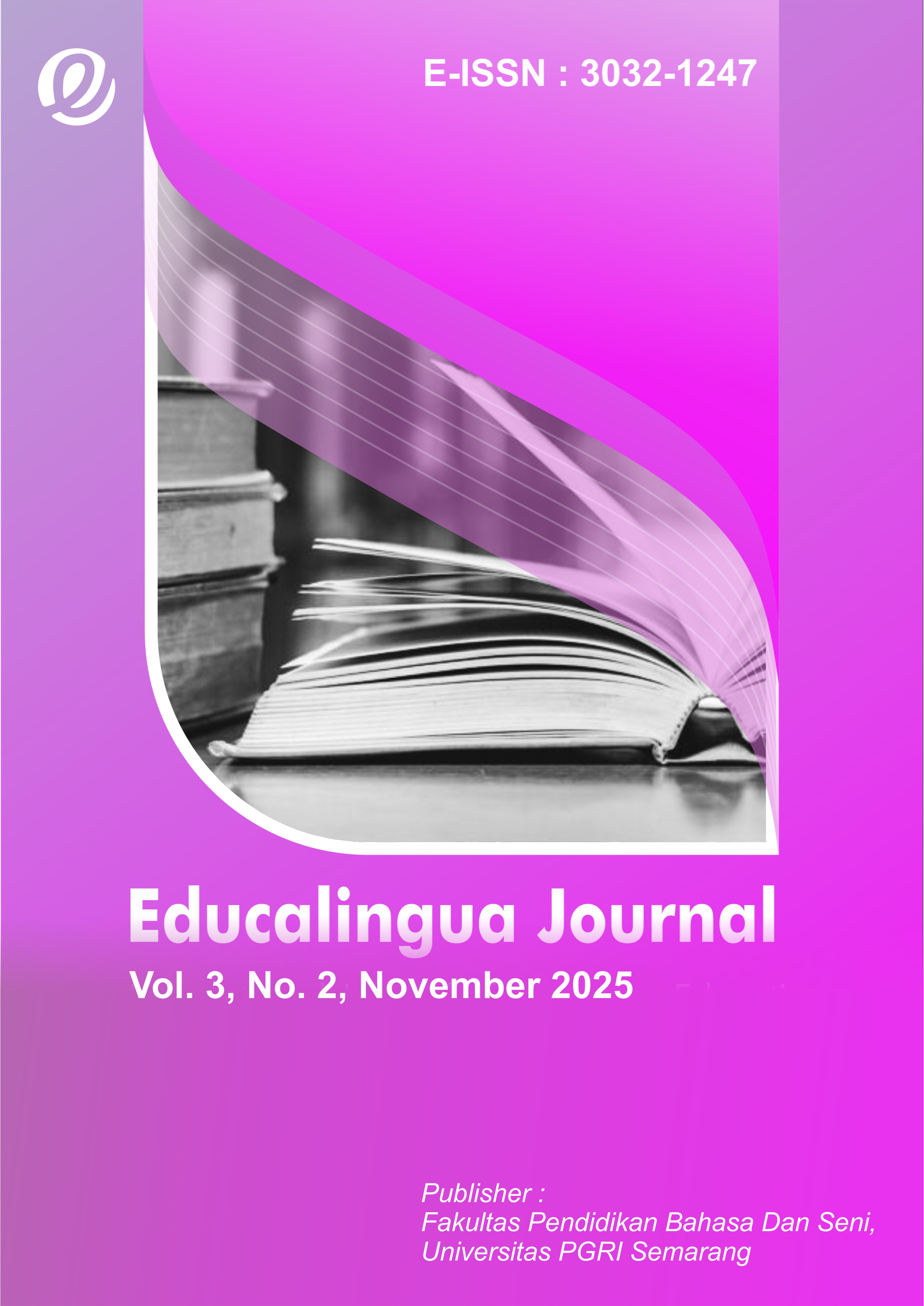Between Trust and Skepticism: Comparative Perceptions of ChatGPT in Academic Writing among EFL Learners in Indonesia and the Philippines
DOI:
https://doi.org/10.26877/educalingua.v3i2.2858Keywords:
ChatGPT, Academic writing, AI literacy, EFL learners, Indonesia , PhilippinesAbstract
This study investigates the comparative perceptions of Indonesian and Philippine EFL students regarding the use of ChatGPT in academic writing, focusing on the interplay between trust and skepticism. Employing a quantitative comparative research design with complementary qualitative inputs, data were collected from 232 university students using a structured questionnaire consisting of 20 closed-ended items analyzed quantitatively and two open-ended items analyzed qualitatively. Descriptive statistics and comparative analysis revealed that both groups perceived ChatGPT positively as a tool that improves writing quality, coherence, and confidence. However, students also expressed ethical concerns about plagiarism, overreliance, and authenticity. Filipino students tended to exhibit higher trust due to greater digital familiarity, while Indonesian students demonstrated stronger skepticism rooted in institutional and moral caution. The findings highlight the coexistence of trust and critical awareness, emphasizing the need for AI literacy education that integrates technological proficiency with ethical reflection. The study contributes to global discussions on AI-assisted writing by contextualizing the phenomenon within Southeast Asian educational settings.
References
Aridan, M., Irwandani, A. Villarama, J., & V. Dela Fuente, A. (2025). Post-Launch Public Interest in DeepSeek vs. ChatGPT: A Comparative Google Trends Analysis in Indonesia and the Philippines. Blockchain, Artificial Intelligence, and Future Research, 1(1), 1–12. https://doi.org/10.70211/bafr.v1i1.166
Balatero, L. M., Jayno, J. R., & Miranda, K. M. (2024). ESL Pre-Service Teachers’ Literacy and Acceptance of ChatGPT as a Generative AI Tool for Writing: A Sequential Explanatory Study. Journal of Tertiary Education and Learning, 2(3), 19-29.
Bedrio, J., Prasodjo, P., & Purba, H. R. P. (2025). Free Writing and ChatGPT to Enhance 11th-Grade Idea Development in Letter Writing.
Chanpradit, T. (2025). Generative artificial intelligence in academic writing in higher education: A systematic review. Edelweiss Applied Science and Technology, 9(4), 889–906. https://doi.org/10.55214/25768484.v9i4.6128
Esmas, R., Florendo, P., Malantic, D., Somontina, J., Beredo, J., & Ong, E. (2024). Analyzing ESL Students Perceptions towards ChatGPT in Academic Writing. Proceedings of the Asian CHI Symposium 2024, 63–69. https://doi.org/10.1145/3704611.3704625
Espartinez, A. S. (2025). Between Innovation and Tradition: A Narrative Inquiry of Students’ and Teachers’ Experiences with ChatGPT in Philippine Higher Education. Social Sciences, 14(6), 359. https://doi.org/10.3390/socsci14060359
Giray, L., Fabros, B., Villarama, J., Gumalin, D. L., & Saavedra, J. B. (2025). Acceptance of and Satisfaction with ChatGPT as Learning Tool in Higher Education Through the Technology Acceptance Model (TAM): A Case from the Philippines. Internet Reference Services Quarterly, 1–20. https://doi.org/10.1080/10875301.2025.2542212
Gustilo, L., Ong, E., & Lapinid, M. R. (2024). Algorithmically-driven writing and academic integrity: Exploring educators’ practices, perceptions, and policies in AI era. International Journal for Educational Integrity, 20(1), 3. https://doi.org/10.1007/s40979-024-00153-8
Hatmanto, E. D., Pasandalan, S. N. B., Rahmawati, F., & Sorohiti, M. (2024). Empowering Creative Education: Applying Chat GPT for Enhancing Student Engagement in Senior Teacher-Driven Instructional Design in the Philippines. E3S Web of Conferences, 570, 03007. https://doi.org/10.1051/e3sconf/202457003007
Herda, R. K., Travero, A. S., Kafabih, A., Koeswoyo, A. W., Sari, R. N., Hakiki, F. I., & Wahidah, N. (2024). Opportunities Of Using Chatgpt In Academic Writing: Perceptions Of The Philippines And Indonesian Students. Jurnal Wahana Pendidikan, 11(2), 205. https://doi.org/10.25157/jwp.v11i2.14922
Lau, Y. L., Abu Bakar, A. L., Chau, S. K., Sik, R. Y., Yap, J. T. K., Yong, H. W., Tan, J. C., & Ambikapathy, A. (2025). Language Course Writing Task and AI-Generated Writing Detection: An Ethical Concern. In V. P. H. Pham, A. Lian, A. Lian, & S. R. Barros (Eds.), Advances in Computational Intelligence and Robotics (pp. 261–290). IGI Global. https://doi.org/10.4018/979-8-3693-7260-9.ch012
Mabuan, R. A. (2024). ChatGPT and ELT: Exploring Teachers’ Voices. International Journal of Technology in Education, 7(1), 128–153. https://doi.org/10.46328/ijte.523
Mali, Y. C. G. (2025). Exploring the Use of ChatGPT in EFL/ESL Writing Classrooms: A Systematic Literature Review. Journal of Language and Education, 11(2), 137–156. https://doi.org/10.17323/jle.2025.21793
Malvado, V., Prastikawati, E. F., & Wiyaka, W. (2022). IMPROVING ENGLISH WRITING SKILL BY UTILIZING QUIZIZZ AS A TECHNOLOGY-BASED ASSESSMENT. LINGUAMEDIA Journal, 2(02). https://doi.org/10.56444/lime.v2i02.2573
Maspul, K., Chemistry, V., Melinda, Y., Wisudayanti, K., Fedora, & Rochmah, D. F. (2025). How Can ChatGPT Empower Indonesian Classrooms? Frontiers in Research Journal, 1(3), 26. https://doi.org/10.47134/frontiers.v1i3.423
Meniado, J. C., Huyen, D. T. T., Panyadilokpong, N., & Lertkomolwit, P. (2024). Using ChatGPT for second language writing: Experiences and perceptions of EFL learners in Thailand and Vietnam. Computers and Education: Artificial Intelligence, 7, 100313. https://doi.org/10.1016/j.caeai.2024.100313
Munasih, D. S., Prastikawati, E. F., Wiyaka, W., & Adeoye, M. A. (2024). Writing Assessment Literacy: Investigating EFL Teachers’ Writing Assessment Practices in A Vocational School. Educalingua, 2(1), 12–24. https://doi.org/10.26877/educalingua.v2i1.411
Penpeña, R. A. P. (2025). Perceptions of AI Collaboration in Writing among Teacher Aspirants: An Empirical Cross-Sectional Study among Teacher Aspirants. EthAIca, 4, 426. https://doi.org/10.56294/ai2025426
Prastikawati, E. F., Adeoye, M. A., Curle, S., & Riwayatiningsih, R. (2025). Beyond the Classroom: Investigating Learning and Motivation among EFL Undergraduate Students in Indonesia. Indonesian Journal on Learning and Advanced Education (IJOLAE), 341–360. https://doi.org/10.23917/ijolae.v7i2.8579
Rofikah, U., Arafah, B., Nasmilah, & Harewaty. (2025). Indonesian Students’ Perception of AI-Assisted EFL Academic Writing. In M. Hasyim, M. A. Armin, & Y. Yusuf (Eds.), Proceedings of The 5th International Conference on Linguistics and Cultural Studies 5 (ICLC-5 2024) (Vol. 916, pp. 410–419). Atlantis Press SARL. https://doi.org/10.2991/978-2-38476-394-8_46
Rosdiana, S., Noercolies, M. A., & Fauzan, M. H. (2024). The Use of Artificial Intelligence in Teaching Writing Skills. EDUCASIA: Jurnal Pendidikan, Pengajaran, Dan Pembelajaran, 9(1), 45–56. https://doi.org/10.21462/educasia.v9i1.251
S. Peneyra, J. A., F. Paras, R. L., B. Tan, S. G., & A. Villarama, J. (2025). English Language and Literature Teachers on the Integration of Artificial Intelligence in the Philippine Classroom Context. Language, Technology, and Social Media, 3(2), 214–230. https://doi.org/10.70211/ltsm.v3i2.211
Septyaningrum, L., Wiyaka, W., & Prastikawati, E. F. (2024). Picture-Cued Sequence Task: How Does It Effect to Students’ English Writing Ability? International Journal of Research in Education, 4(2), 410–422. https://doi.org/10.26877/ijre.v4i2.816
Werdiningsih, I., Marzuki, Indrawati, I., Rusdin, D., Ivone, F. M., Basthomi, Y., & Zulfahreza. (2024). Revolutionizing EFL writing: Unveiling the strategic use of ChatGPT by Indonesian master’s students. Cogent Education, 11(1), 2399431. https://doi.org/10.1080/2331186X.2024.2399431
Downloads
Published
Issue
Section
License
Copyright (c) 2025 Educalingua Journal

This work is licensed under a Creative Commons Attribution-NonCommercial-ShareAlike 4.0 International License.








